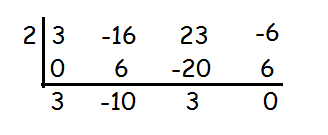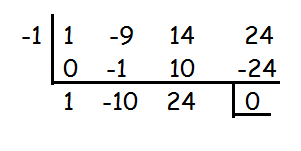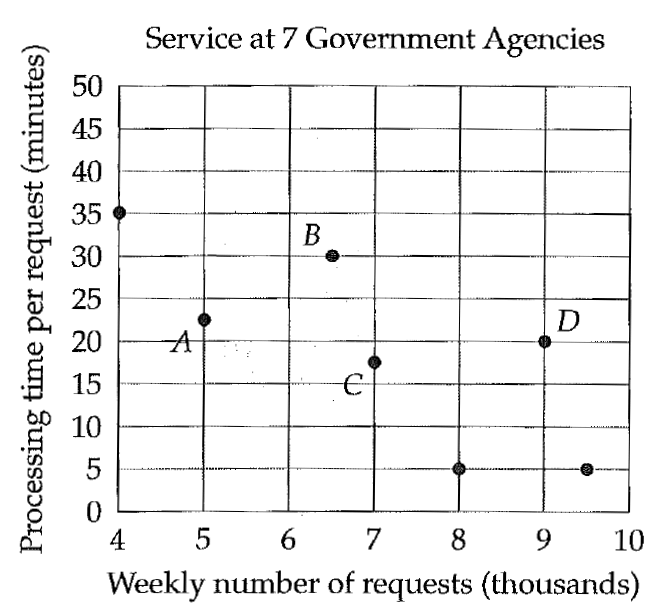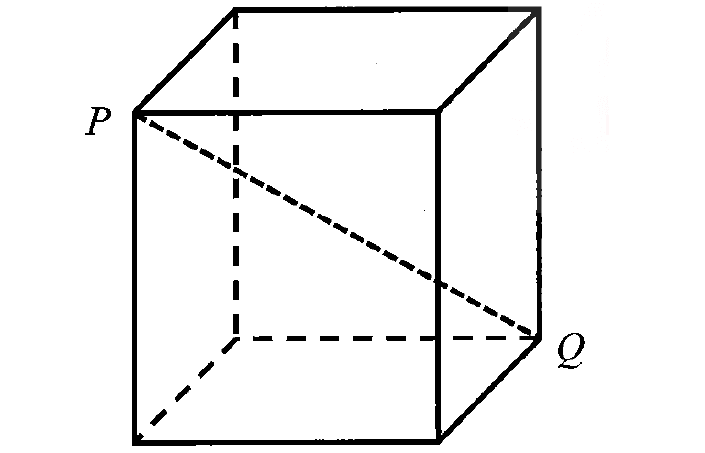CUBIC EQUATION PRACTICE PROBLEMS
Problem 1 :
Solve the equation 3x3 −16x2 + 23x − 6 = 0 if the product of two roots is 1.
Solution :
Let us solve the given cubic equation using synthetic division.

We ge the zero remainder by applying the value of x as 2. So, (x - 2) is a factor.
The factors are (x - 2) (3x2 - 10x + 3)
By factoring the quadratic equation, we get
= 3x2 - 1x - 9x + 3
= x (3x - 1) - 3(3x - 1)
= (x - 3) (3x - 1)
|
x - 2 = 0 x = 2 |
x - 3 = 0 x = 3 |
3x - 1 = 0 3x = 1 x = 1/3 |
Hence the values of x are 2, 3 and 1/3.
General form of polynomial of 4th degree.
ax4 + bx3 + cx2 + dx + e = 0
α + β + γ + δ = -b/a
α β + α γ + αδ + βγ + βδ + γ δ = c/a
α β γ + α β δ + α γ δ + βγδ = -d/a
α β γ δ = e/a
Problem 2 :
Find the sum of squares of roots of the equation :
2x4 - 8x3 + 6x2 - 3 = 0
Solution :
By comparing the given equation with general form of polynomial of degree 4, we get
a = 2, b = -8, c = 6 and d = -3
α+β+γ+δ = -b/a = 8/2 = 4
αβ+αγ+αδ+βγ+βδ+γδ = c/a = 6/2 = 3
We have to find
Applying the algebraic identity α2 + β2 + γ2 + δ2
(a+b+c+d)2 = a2+b2+c2+d2 + 2(ab + ac + ad + bc + bd + cd)
we get
(α+β+γ+δ)2 = α2+ β2 + γ2 + δ2 + 2 (αβ+αγ+αδ+βγ+βδ+γδ)
α2+ β2 + γ2 + δ2 = (α+β+γ+δ)2 - 2 (αβ+αγ+αδ+βγ+βδ+γδ)
α2+ β2 + γ2 + δ2 = (4)2 - 2 (3)
= 16 - 6
= 10
Hence the sum of squares of roots of the equation is 10.
Problem 3 :
Solve the equation x3 - 9x2 + 14x + 24 = 0 if it is given that two of its roots are in the ratio 3: 2.
Solution :

-1 is one of the roots of the cubic equation.By factoring the quadratic equation x2 - 10x + 24, we may get the other roots.
x2 - 10x + 24 = x2 - 6x - 4x + 24
= x(x - 6) - 4(x - 6)
= (x - 4) (x - 6)
x - 4 = 0 and x - 6 = 0
x = 4 and x = 6
Hence the roots of the cubic equation are -1, 4 and 6.
Kindly mail your feedback to v4formath@gmail.com
We always appreciate your feedback.
©All rights reserved. onlinemath4all.com
Recent Articles
-
Digital SAT Math Problems and Solutions (Part - 153)
Apr 29, 25 12:18 PM
Digital SAT Math Problems and Solutions (Part - 153) -
Digital SAT Math Problems and Solutions (Part - 152)
Apr 28, 25 11:54 AM
Digital SAT Math Problems and Solutions (Part - 152) -
Digital SAT Math Problems and Solutions (Part - 151)
Apr 26, 25 11:18 AM
Digital SAT Math Problems and Solutions (Part - 151)

